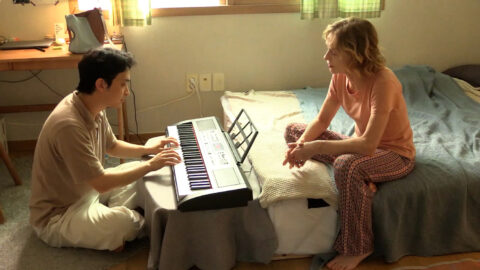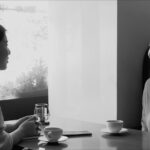“To be without a speck of shame until death” — “Foreword” by Yun Dong-Ju (1941)
Iris (Isabelle Huppert) has a very unorthodox method of teaching French. She speaks almost exclusively to her clients in English. After a long-winded conversation, they play a bit of music. A self-made composition or even Liszt’s “Liebestraum.” Afterwards, she asks them, “How did it make you feel?” After several awkward back-and-forths, they open up — about a loved one, a feeling of shame, or a wish to be better. She then translates these complex contradictory emotions into French, writes them on a card and hands them back to their students.
If this odd way of teaching French sounds made up — and no, it is not the Montessori school — that’s because it is. Iris, upon entry into Korea only a couple of months ago, devised this method as a novel way to make money. She’s not even sure if it will work.
Isabelle Huppert was pretty awful in Sidonie In Japan (Élise Girard, 2023), which in its cross-cultural melee between French and Japanese norms failed to make any meaningful statement at all. With Hong, however, marking their third collaboration together, her natural presence and ability to shape narratives to her will is on full, commanding display. Yet, she’s rarely been this unhinged, using her iconic cinematic presence to sow chaos across polite Korean society.
There are moments in A Traveler’s Tale (2024) where it feels like Hong adopts a Straub-Huillet mode: a static mise en scène where characters recite literary works or read directly from a slab of stone, while the wind moves in the breeze and the excellent sound design (recorded by Seo Yujin) creates a form of quiet contemplation. Here the poetry is taken from the famed Korean poet Yun Dong-Ju, who died in a Japanese prisoner-of-war camp in 1945 at the young age of just 27. Of course, upon learning this news, Iris inappropriately points out: “He was so handsome!”
By appropriating one of Korea’s most famed poets, who even in brief translation, appears to contain work of great lyrical beauty and clarity, as well as pointing out his demise at the behest of foreigners, Hong slyly comments on worries about outside influence, with Huppert’s character a strange and unwelcome intrusion into Korean society.
Particularly heinous is the way she comments on the way her client Haesoon (Kwon Haehyo) bows to Yun’s memorial, using it as a way to drive a wedge between him and his wife Yeonhee (Cho Yunhee). But perhaps this woman is not even mortal? In a particularly odd moment, she seems to disappear in the flash of a single back-and-forth pan, the self-conscious camera adding a sprinkle of magic to her mayhem.
Her job pays very well, Hong seemingly making fun of Koreans’ love of foreigners and willingness to hand over actual for the worst French lessons of all time. In just one day, she nearly has half of her friend (or lover?) Inguk’s (Ha Seongguk) rent.
Hong’s style is so ubiquitous — simple medium shot, the occasional zoom, reverse zoom, etc — that the actual ability for his actors to deliver a tense and emotional moment for ten minutes or more, is often sorely overlooked; whether it’s a comedy of passive-aggressive manners or a no-holds-barred letting go of long pent-up emotion. This is especially true when Inguk’s mother Wonju (Lee Hyeyoung) turns up, resulting in some of the finest duration acting in Hong’s oeuvre.
All the while, Huppert’s Iris, decked in a striking floral dress, green cardigan and a straw hat, is free to roam the parks of Seoul, playing on the recorder and getting wrecked on makgeolli. Perhaps she may have a past, but we’re not learning about that here. She remains a strange, enigmatic agent of chaos throughout; both a vehicle for national critique and a good old laugh.

Redmond is the editor-in-chief of Journey Into Cinema.




